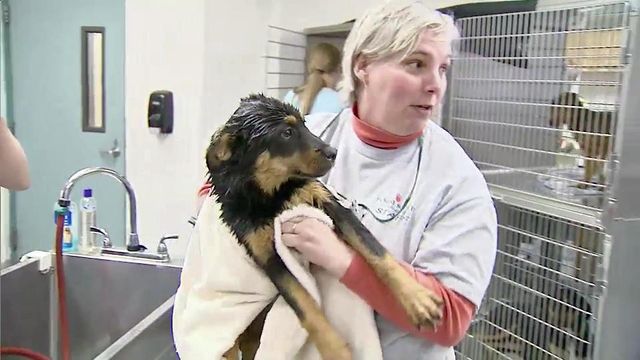Pets can't be ignored when planning for disasters
Pets are a big part of millions of American homes, but they are often forgotten when families sit down to plan for natural disasters.
Posted — UpdatedPets are a big part of millions of American homes, but they are often forgotten when families sit down to plan for natural disasters.
Ellen Lowery said the failure to plan often creates frantic – and sometimes tragic – situations for pet owners hoping to find or rescue their animals following a catastrophic event.
"You don't have time to plan when a disaster happens," Lowery said when speaking about National Animal Disaster Preparedness Day, which is May 8. "Not planning is the biggest mistake people make."
The first step for families should be to make sure that dogs and cats have proper identification and the ID has the most up-to-date contact information.
"Plan to prepare just like you would for your family," Lowery said. "Have a pet emergency kit that has several days worth of food, water, their medical history and contact information for your veterinarian."
Katie Borremans, who works with the Humane Society, said there are also ways to let first responders know what they may find when entering a home impacted by a natural disaster.
"Those little stickers that you can put in the window of your home to let rescuers know there are pets inside are great," she said. "It's a good way to alert them."
For the families who do become separated from their pets in a disaster, Borremans said animal shelters are the best place to look for lost animals.
Locally, North Carolina State University's College of Veterinary Medicine requires students to receive disaster preparedness training that can help pets and their owners.
“N.C. State has the only college of veterinary medicine that requires all of its students to take a formal disaster response training program, and we hope this is a model for others to follow,” Dr. Diane Dunning, director of N.C. State's Animal Welfare, Ethics and Public Policy program, said in a statement. "Students, who must take the program to graduate, earn advanced state and federal disaster training certifications."
Students at N.C. State are taught how to set up and operate mobile animal shelters and how to respond to an epidemic in livestock to keep disease from spreading.
"The training touches on a host of skills required in the wake of a disaster: fundamental psychology, effective communication, hazardous material handling and the ability to anticipate, identify and respond to new needs as they crop up," Dunning said.
Related Topics
• Credits
Copyright 2024 by Capitol Broadcasting Company. All rights reserved. This material may not be published, broadcast, rewritten or redistributed.





